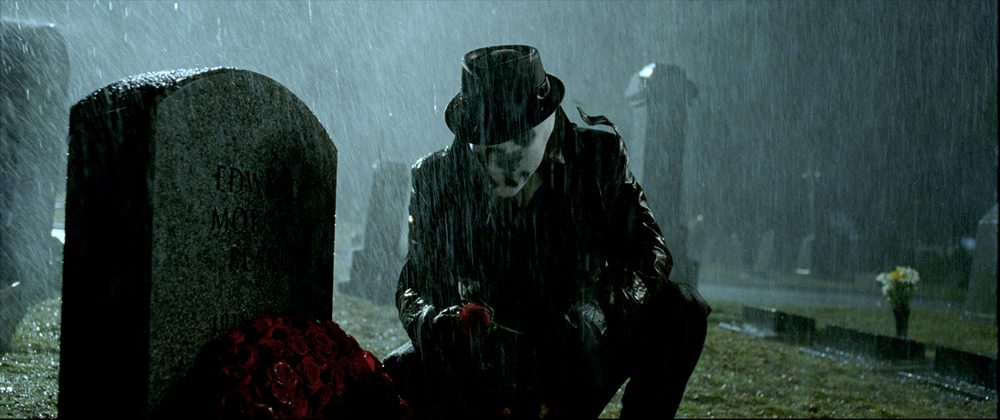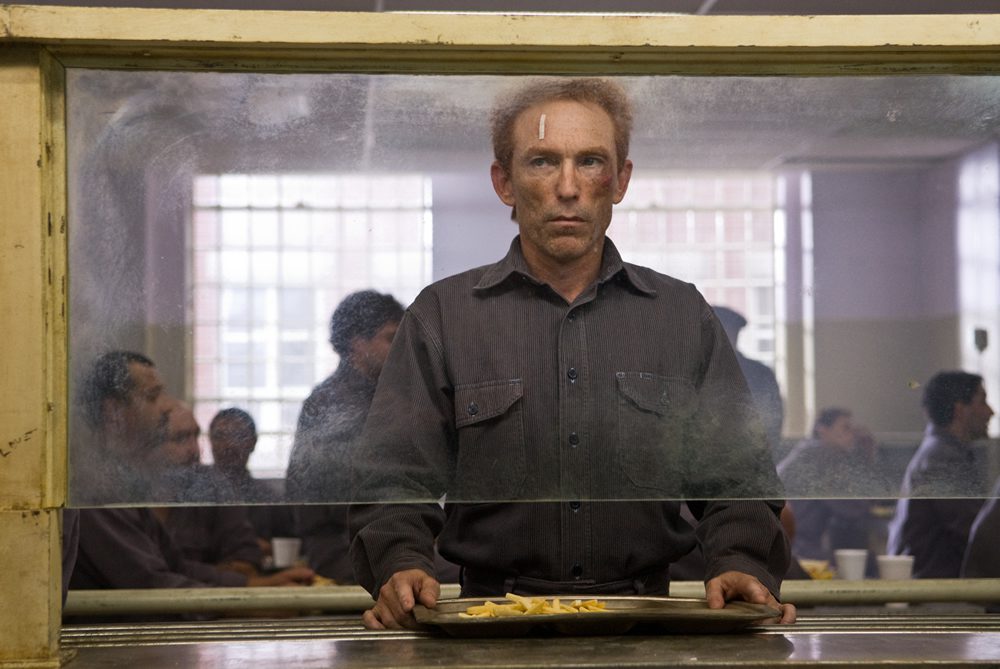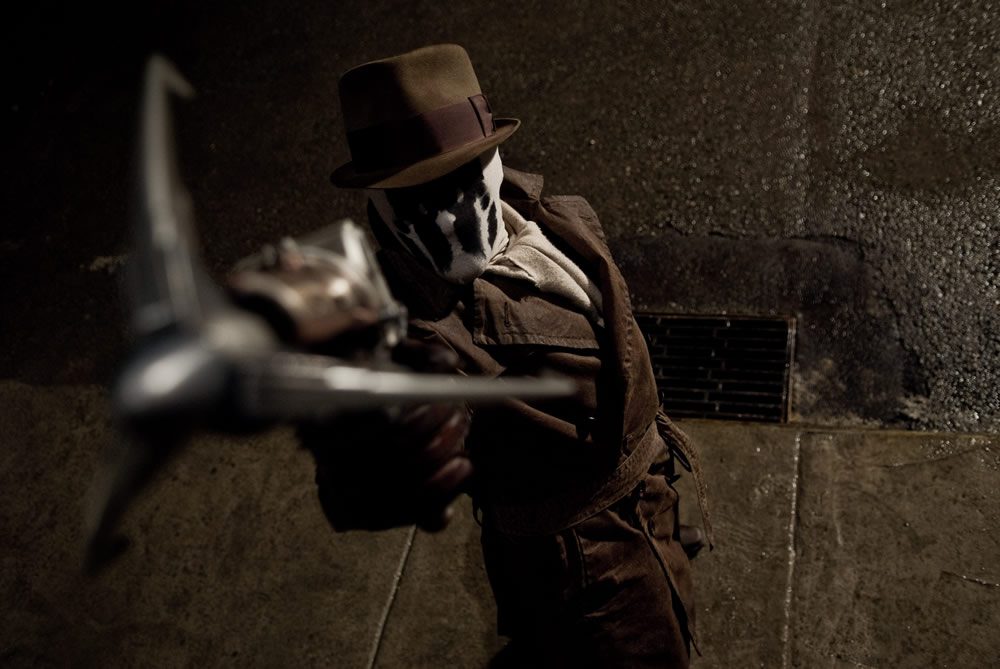In Alan Moore’s Watchmen, Walter Kovacs, AKA Rorschach, is a character considered by a lot of readers to be a deontologist—and no, this is not some kind of creepy doctor. A deontologist is someone who believes that the morality of actions should be based on whether they are right or wrong according to whatever specific set of rules is chosen as opposed to the consequences of said actions.
When talking about deontological ethics, there is usually a sense of moral obligation derived from a source. This source could be a series of rules inherent to the universe, religion, cultural values, or anything else really (more on this later).
I also share the opinion that Rorschach subscribed to deontology. We see this not only through his famously “upbeat” journal entries, but also through dialogue with other characters, and most importantly, through his actions. This way of looking at the character seems as clear-cut as the black and white mask he wore around while beating heinous criminals to a pulp for shoplifting. But I’m of the idea that there’s more to it than that. Even his mask (and vigilante name) is based on Rorschach test inkblots, which can be seen as different things by different people.
So why was he so ruthless in his convictions? Why was he so compelled to kill and maim “bad” people even when society didn’t seem to give a crap? What made Walter Kovacs become Rorschach?
I recently saw an interview with Alan Moore in which he mentions something that caught my attention.
“It wasn’t until halfway through, that we realized that Rorschach would not survive the book,” said Moore. “It just became obvious. We realized that this was a character, if ever there was a character, who’s got a king-sized death wish. He was in pain, psychological pain, every moment of his life. And he wanted out of it, but with honor—in whatever his own twisted standards of honor might’ve been.”
And here we go, boys and girls.

Turns out Walter Kovacs actually wanted to die. But why? Why was he in pain? Sure, you can point to his childhood, growing up with an abusive mother and exposed to all kinds of things that might’ve had something to do with it. But a lot of people deal with these issues. Not a lot of people, however, go around being vigilante sociopaths or wanting to drop toasters in their bathtubs—even the psychiatrist he got assigned when he was arrested, Dr. Long, mentioned at some point that this wasn’t what sent Walter over the edge. And what does Moore mean when he says Rorschach wanted out of it, “but with honor,” anyway?
Enter my new favorite wandering-eyed French philosopher, Jean-Paul Sartre, and his take on the philosophy of existentialism.
The philosophical ideas of existentialism got really popular right around the time after World War II, the great dumpster fire of the 20th century. The period of social and political craziness that followed was not unlike the not-so-fictional setting of Watchmen. It was a breeding ground for all sorts of “fun” ideas about life, the universe, and our place in it.
Now, I’m one-hundred percent about to over-simplify Sartre’s existentialism, which is something that aptly enough and according to him, I’m entirely free to do. In broad terms, the idea is that “existence precedes essence,” and not the other way around as it had been accepted since like Plato.
In other words, there’s no preordained thing that makes us who we are. We don’t know what the hell we’re supposed to do with our lives because there’s no cosmically prescribed purpose or meaning to it. There’s no god to lead the way, no instructions manual, and no fixed way things ought to be. Nothing makes us choose anything or be anyone. We exist in a seemingly random universe, and that’s it.
From this idea, Sartre suggests that not only are we free to make our own choices for how to live our lives—since there’s nothing forcing us one way or the other—but that we’re also entirely responsible for those choices and their consequences. Even avoiding making a choice is a choice in itself so, ironically, we can’t escape freedom.
This, in turn, can cause a sort of existential crisis if you will—a feeling of discomfort and maybe even anguish since we’re forced to make choices, by virtue of merely existing, and there’s no absolute guidance on how to do so. Couple that with the idea that nothing has any inherent purpose or meaning, and there we go. As Sartre puts it, “We’re condemned to be free”. As I put it, we’re screwed.
By now, you’re probably asking yourself what this whole thing has to do with why Rorschach lit up that dude who supposedly killed a little girl like it was Saturday evening of Burning Man.
Here’s your answer: I think Walter Kovacs was suffering from this same exact existential anguish.

The following is the beginning of a quote that I’ll break down for the purpose of this article—it’s what Rorschach tells Dr. Long during one of their sessions about what he saw and felt when he burned the presumed child-killer alive:
“Felt cleansed,” said Rorschach. “Felt dark planet turn under my feet and knew what cats know that makes them scream like babies in night. Looked at sky through smoke heavy with human fat and God was not there. The cold, suffocating dark goes on forever, and we are alone. Live our lives, lacking anything better to do. Devise reason later. Born from oblivion; bear children, hell-bound as ourselves; go into oblivion. There is nothing else.”
Yes. Rorschach was very fun at parties. But maybe he was actually onto something. Maybe so are we.
In Sartre’s aptly titled Nausea, he explored how uncomfortable the uncertainty that comes with this realization feels. The existential nausea is pretty much what people experience when confronted with the reality that no matter how hard they try to find real meaning, reason or purpose to existence—be it through religious faith, a belief in fate or destiny, established social principles, or whatever—the universe doesn’t give a damn.
Maybe this was the source of Walter Kovacs’ “king-sized death wish.”
Another thing Sartre said is that sometimes this anguish makes people gravitate toward living in what he called “bad faith.” He used this term to refer to those ideas that we sometimes tell ourselves about the world, presumably, to eliminate the uncertainty that comes from total freedom. If we subject ourselves to a set of rules or beliefs that someone else made up, we don’t have to think about it anymore. Examples of this can be a religion, prepackaged moral codes, the social or political status quo, “common sense” of how things are, etc. The important thing here is that these ideas serve as something to hide behind instead of embracing the absurdity of the world and the freedom we’re condemned by—daring to see the falseness of human constructs, and challenging them.
Rorschach gives us what could be seen as a vague example of this with his Pagliacci joke.
“Heard joke once,” said Rorschach. “Man goes to doctor. Says he’s depressed. Says life seems harsh and cruel. Says he feels all alone in a threatening world where what lies ahead is vague and uncertain. Doctor says ‘Treatment is simple. Great clown Pagliacci is in town tonight. Go and see him. That should pick you up.’ Man bursts into tears. Says, ‘But doctor…I am Pagliacci.'”
If the clown who’s supposed to offer this man a relief from his crisis is actually the suffering man himself, what does that say about what people tell themselves in search of a way out?
But there is a solution according to existentialism: Since we are, after all, free to do anything—and there’s no preestablished essence that defines who we are or gives us purpose—we can, and must, create our own. It’s the only way to cope with the existential nausea.
Can I prove that Rorschach believed in all of this? Well, not really. But check out what he said as we continue the quote we started earlier (what he told Dr. Long):
“Existence is random,” said Rorschach. “Has no pattern save what we imagine after staring at it for too long. No meaning save what we choose to impose. This rudderless world is not shaped by vague metaphysical forces.”
Sartre would be proud. I think Walter Kovacs realized the basic ideas of existentialism. But there’s something else—because of course there’s something else.
If Kovacs believed that we (as humans) are the only ones responsible for what we are and for our actions, then he also would’ve believed that criminals commit their crimes entirely because they freely decide to do so. Everyone’s freedom, and thus responsibility, are their own. They choose their purpose, create that meaning for their lives, but more importantly, they shape their world through this as well.
That last part is relevant because there’s another philosopher who posited something before Sartre—I’m trying to come up with a clever, non-cliché pun using his last name but I Kant, so we’ll just move on.
Immanuel Kant is that philosopher.
His opinion when it comes to choosing what to do in this life is similar, albeit somewhat contradictory at the same time, to Sartre’s. He basically claimed that because humans have the ability to use reason, they have a responsibility to morally choose based on it. He called this the categorical imperative. The interesting thing that links this to both Sartre and Rorschach is that in this chosen morality, according to Kant, we should only act in such a way that the principle on which you act could be a universal law. In a way, we’re applying our chosen morality on everyone else too—supposedly because, since it’s based on reason, it’s pretty much universal.
This differs from Sartre’s views in that it implies there’s actually a way we can find out how to choose, and of course, Sartre didn’t believe there was such a thing.
However, Sartre also believed that when a person determines something to be right for themselves, they are also determining it to be good for everyone. “In choosing myself, I choose man,” Sartre said.
So not only can we infer that Sartre took something from Kant when it comes to his ideas on making our choices, but this also reflects on our boy, Walter Kovacs, and his deontological tendency within the absurdity of life when seen through his existential lenses—or inkblot mask, more aptly.
Back to the quote:
“It is not God who kills the children,” said Rorschach. “Not fate that butchers them or destiny that feeds them to the dogs. It’s us. Only us.”
All of this—his personal experiences, existentialism, deontology, and their implications on morality—left him with a choice of his own: to create a meaning and purpose for his own life. And so, as Walter Kovacs stood in front of the burning building—an inferno he had started himself—something happened.
“Streets stank of fire,” he said. “The void breathed hard on my heart, turning its illusions to ice, shattering them. Was reborn then, free to scrawl own design on this morally blank world. Was Rorschach.”
“Was Rorschach,” now it all makes sense, doesn’t it?
Here, ladies and gentlemen, is where we come full circle. Rorschach, nauseous with existential anguish and personal trauma, chose what he determined to be the right way to go about life. And in doing so, he also chose for everyone else. Existentialism meets deontology. “Criminals” meet Rorschach’s wrath.
Once Walter Kovacs chose to be Rorschach, the mask he wore became his face. Rorschach was not his disguise, Walter Kovacs was. He was so uncompromising in his convictions that at the end, when confronted with the reality of what Ozymandias’ utilitarian master plan had caused—New York City gone to hell at the hands (tentacles?) of a mutant Cthulhu-looking thing—he wouldn’t let it go.
He had created a meaning for his life, applied it to the world, committed to it until the very end, and ultimately drove Dr. Manhattan to kill him by refusing to hide the lie that was supposed to save the world. All of this, because he chose to.
This is what he wrote in his journal before going to face Ozymandias, the last journal entry he would ever make:
“For my own part, regret nothing. Have lived free from compromise and step into the shadow now without complaint.”
And that’s it, my friends.
I’m not saying Rorschach was an example to follow. His response to news about his mother being murdered—forced to chug Drano or something—was simply the word “good.” He makes a comment about Adrian Veidt possibly being homosexual in a way that implies disapproval or maybe even contempt. He justifies the Comedian’s rape attempt on the original Silk Spectre as an example of “moral lapses of men who died in their country’s service.” All of these are values that I don’t personally share. But my point is, were we to go along with the existential philosophy that I’ve spent all of my recent time off work writing about here, we’d conclude that there is no easy way to judge.
At the end of the day, at least he was no longer in pain. As Moore would say, he got out of it “in whatever his own twisted standards of honor might’ve been.” He realized he was free to choose, to not just accept the world for what it supposedly was, and he went balls to the wall with it. He was hated by the criminal underworld, rejected by the police, and even some of his fellow costumed vigilantes didn’t agree with or like him too much for that matter (talking about you, Laurie). But still he said, “screw it.” That’s what I think.

You might be calling fake news at this point—or think this philosophy is too damn depressing—and I wouldn’t blame you. A lot of people have criticized it too. But I don’t think this is necessarily a pessimistic worldview.
It encourages freedom. It says that things don’t have to be “the way things are.” There’s no rule that says I have to work a job I hate, no cosmic force that prohibits me from reinventing myself at 90 if I want to. According to this philosophy, apart from the things that we physically can’t change (like physical limitations, or the time period we’re born in, for example) we’re free to do whatever we want. Of course we are also responsible for the consequences we get, but we can still make our own choices. We create our essence, for better or worse. It’s a philosophy about what you succeed in doing with what’s been done to you. And in doing so, we create something where there was nothing.
That being said, I don’t know if I identify completely with Sartre’s vision of existentialism. Even Sartre himself apparently regretted some of what was published in one of the most relevant texts on the subject, Existentialism Is A Humanism. But let’s say, for the sake of this article, that I do.
In that case, I think I’m still creating my own personal meaning, purpose, and worldview, and that’s fine as far as I’m concerned.
But what about you? If you’re ever confronted with the apparent meaninglessness of the universe, if you ever feel that existential nausea, or realize you’re condemned by your own freedom, will you live in “bad faith” or will you create your own meaning and apply it to the seemingly blank canvas of life? What choices will you make?
Or, as Rorschach might put it: If you felt dark planet turn under your feet and learn what cats know that makes them scream like babies in night, looked at the sky and God was not there, saw the cold suffocating dark go on forever and realize we are alone…If the streets stink of fire and the void breathes hard on your heart, turning its illusions to ice, shattering them, will you be reborn then, free to scrawl own design on this morally blank world?
Walter Kovacs was Rorschach.
Who will you be?


Wonderful article. Well thought out, engaging and incredibly entertaining. Rorschach is usually described as a nihilistic anti-hero with the moral compass of Ayn Rand, but as you’ve pointed out, he’s much closer to having Jean Paul Sartre’s worldview than Ayn Rand’s… anything!
Rorschach may seem to be motivated by Objectivism, but he’s more than just the male SuperAyn. Much more. I mean, he’s more attractive than Ayn (sure, Walter may not be conventionally handsome, but Ayn had a face that looked like a dime store Ronald Reagan mask half melted from sitting on a hot radiator overnight, so… yeah…), he’s more hopeful, more perky, and more of an “upbeat people person” than Ms. ATLAS SHRUGGED at THE FOUNTAINHEAD (oy…), and Walter Kovacs bathes more regularly, smells better and is a WAY better dancer than Ayn Rand ever HOPED to. 🙂
All that said, well done. I think I’m going to reread WATCHMEN again – – for the 5th or 27th time – – with all of this in mind. So, thanks for that and for this piece.